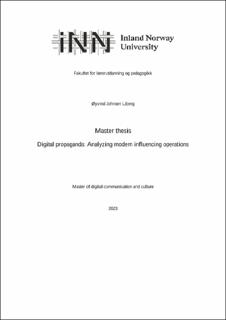| dc.contributor.advisor | | |
| dc.contributor.author | Liberg, Øyvind Johnsen | |
| dc.date.accessioned | 2023-07-18T16:11:12Z | |
| dc.date.available | 2023-07-18T16:11:12Z | |
| dc.date.issued | 2023 | |
| dc.identifier | no.inn:inspera:136494868:71331907 | |
| dc.identifier.uri | https://hdl.handle.net/11250/3079820 | |
| dc.description.abstract | Propagandastudier har vært et pågående tema i over et århundre. I en moderne kontekst har mye av propaganda blitt flyttet på nettet og med det har propagandaens metodikk gjennomgått endringer. Denne oppgaven studerer den eksisterende litteraturen om propaganda, først og fremst propagandakonseptet som utviklet av Jacques Ellul, for så å bruke det som et rammeverk for et modernisert propagandakonsept tilpasset realitetene i det digitale rommet.
Deretter går jeg igjennom 5 rapporter om fiendtlige påvirkningsoperasjoner, spesielt rettet mot valg i USA, for så å bruke en dokumentanalysemetode til å trekke ut relevant informasjon og forklare hvordan russiske etterretningstjenester strukturerer sine påvirkningsoperasjoner og forklarer hvorfor de er strukturert som de er.
Jeg fant at det teoretiske rammeverket til Ellul gir fortsatt et solid grunnlag for å forstå påvirkningsoperasjoner, men noe modernisering var nødvendig. Spesielt rundt gruppeatferd på net, som er forskjellig fra mer tradisjonell familiær gruppeatferd. Elluls påstand om at akademikeren er særlig utsatt måtte forlates ettersom alle brukere innenfor det digitale rommet har den samme sårbarheten for propaganda som tidligere var til stede hovedsakelig hos akademikere. Den største endringen var angående individets deltakelse i sin egen propagandisering, mye på grunn av en nyere oppdagelse angående individers naturlige tiltrekning mot negativ informasjon, som jeg argumenterer medfører en naturlig tiltrekning mot propaganda.
Dokumentanalysens funn viser at de russiske etterretningstjenester i stor grad følger propagandastrukturen slik den var forklart av Ellul, med forventede endringer i henhold til det moderniserte propagandabegrepet. Fokuset på moderne påvirkningsoperasjoner ser ut til å være fokusert på å skape handling. Den er dedikert mot fremstillelse av spesifikk atferd og forsøk på å skape mennesker som, med riktig påvirkning, vil reagere på spesifikke forutsigbare måter.
De teoretiske funnene gir også noen urovekkende implikasjoner om mennesker og gruppers potensiale for selvradikalisering, selv uten dedikert innsats fra en fiendtlig enhet. | |
| dc.description.abstract | The study of propaganda has been an ongoing topic well over a century, and in a modern context much of propaganda has moved online and with that some dynamics of how it functions have changed. This thesis studies the existing literature on propaganda, primarily the propaganda concept as developed by Jacques Ellul, and to use that to as a framework while modernizing it to the realities of the digital space.
After which I go through 5 reports on hostile influence operations, particularly targeting elections within the United States, and to use a document analysis method to extract the relevant information and explain how Russian intelligence services structure their influencing operations and why they are structured as they are.
While studying the theoretical framework of Ellul I found that it still provides a solid base for understanding influence operations, however some modernization was required. Particularly in the nature of group behavior online, which is different from more traditional familial group behavior. Ellul’s focus on the academic had to be abandoned as, within the digital space, all participants have the same vulnerability that was previously mainly present within academics. The main change however was about the individual’s participation in their own propagandization, notably caused by the discovery that many individuals will be naturally drawn towards propaganda through a psychological need to hear negative information.
Through the document analysis of the reports I found that Russian intelligence services largely follow the propaganda structure as explained by Ellul, with the expected changes according to the modernized concept of propaganda. The focus on modern influence operations appears to be focused on actionability, causing specific behavior and creating people who, with the right impetus, will react in specific predictable ways.
The theoretical findings provide some concerning implications about people and group’s potential for self-radicalization, even without dedicated efforts by a hostile entity. | |
| dc.language | eng | |
| dc.publisher | Inland Norway University | |
| dc.title | Digital propaganda: Analyzing modern influencing operations | |
| dc.type | Master thesis | |
